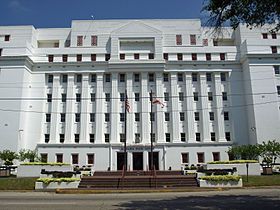Who Is Kay Ivey? What To Know About The Alabama Governor Who Signed The Controversial Abortion Ban

If you’re one to believe in prophecy, then it won’t surprise you that the 74-year-old woman who signed Alabama’s controversial abortion ban into law last week was predicted in her high school yearbook to become governor of the state one day.
Gov. Kay Ivey, a Democrat-turned-Republican from the small town of Camden, signed the bill Wednesday after the state senate comprised of 25 white men and six Democratic women, voted 25-6 in favor of the most restrictive abortion law in the nation.
— Dist 5 Coalition (@Dist_5) May 17, 2019
Flashback to 1963, when Ivey, a senior at Wilcox County High School in Camden, population 2,000, was the subject, among other classmates, of a prognostication suggesting where they would be in 1980 in preparation for the “biggest and best Homecoming yet,” according to a 2017 article in the Montgomery Advertiser. One classmate was now a highly paid bikini model, another a ballet instructor, and one a physical education teacher. The former students had gathered at the Camden courthouse square among much buzz, when the story’s author asked what’s all the excitement about.
One returning student called out, “Why [we] thought you knew. Kay Ellen Ivey has just been elected governor.”
While the year predicted was wrong, and Ivey wasn’t originally elected but elevated from Lieutenant Governor to the post in the wake of a sex and campaign funding scandal involving then-Gov. Robert Bentley, the “prophecy,” as Camden locals refer to it, became reality at 6 p.m. on April 10, 2017, when Ivey became the 54th governor of the state.
Ivey was born in Camden on Oct. 15, 1944, an only child, to Barbara Elizabeth (Nettles) and Boadman Nettles Ivey. Her father served in World War II as an army major, and as a civilian worked for the Farmers Home Association. The family also maintained a farm in nearby Vrendenburgh, population 300, a town with one church.
To hear the stories of childhood neighbors, classmates and just about anyone else that lived in Camden at the time, there was no doubt in anyone’s mind that Ivey would eventually hold the highest office in the state.
In high school, she was vice president of the senior class, a state officer of Future Homemakers of America, Lieutenant Governor at Girls State, band president, Good Citizenship Girl, and Junior Miss, among other activities.
She studied secondary education at Auburn University, originally established in 1856 as East Alabama Male College, and named Auburn University in 1960 after a couple of name changes in between. Ivey continued her involvement in social and civic activities, holding five elected positions in four years at Auburn, including student body vice president.
After Auburn, Ivey was offered a position by Alabama’s first female governor, Lurleen Wallace, the wife of four-term Gov. George Wallace, after her election in 1966. Ivey declined and Lurleen died of cancer after only 16 months in office. Her husband, who had served two terms prior to his wife, held the office for two more terms afterward. Ivey had worked on Lurleen Wallace’s campaign and held her in high esteem but chose the first of two failed marriages instead that relocated her to Sacramento, California. She returned to Alabama after only two years and went to work at Merchants National Bank in Mobile.
At the age of 35, she accepted an appointment to a cabinet position under Gov. Fob James. In 1982, as a clerk of the House of Representatives, she learned legislative processes and made a failed run for state auditor the same year. In 2002, she changed her party affiliation to Republican and was elected state treasurer. She was re-elected to the post in 2006 and began a run for governor in 2010, and then decided to run for lieutenant governor instead. She won a narrow victory, 51% to 48%, against Democrat Jim Folsom Jr., and became Alabama’s 30th Lieutenant Governor. She won a second term in 2014, against Democrat James Fields Jr., with 63% of the vote. Ivey was sworn in as governor after Bentley’s resignation, and won election to the post in 2018.
Ivey made her stance on abortion clear when the 11th Circuit Court of Appeals blocked the Unborn Child Protection from Dismemberment Act in early 2018.
“We should not let this discourage our steadfast commitment to protect the lives of the unborn, even if that means taking this case to the U.S. Supreme Court,” she said.
.@BernieSanders says "Abortion is a constitutional right." - His statement prompted swift rebuke by @March_for_Life saying "When human life begins, human rights begin" -|| Where do you stand on #Abortion? - Read, Comment, Retweet! https://t.co/ET1ai3bVNZ
— Sara A. Carter (@SaraCarterDC) May 15, 2019
Ivey also opposes Medicaid expansion, advocates for school administrators certified under the Alabama Sentry Program to carry guns on campus to deter attacks, and supported the candidacy of Alabama Chief Justice Roy Moore after the Washington Post published reports detailing allegations of sexual abuse against minors by Moore. Her rationale was to preserve the Republican majority in the U.S. Senate.
© Copyright IBTimes 2024. All rights reserved.





















